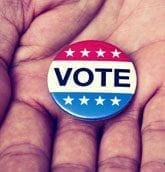On June 2, 1924, the Indian Citizenship Act was signed into law, granting U.S. citizenship to Native people. It was a milestone, but not a finish line. Citizenship didn’t guarantee the right to vote — and even today, that right is under attack.
Just last week, more than 100 years after the Act’s passage, the Spirit Lake Tribe, the Turtle Mountain Band of Chippewa, and individual Native voters filed a powerful petition urging the full Eighth Circuit Court of Appeals to reverse a decision that threatens to erase hard-won gains in Native voting rights.
The case, Turtle Mountain Chippewa v. Howe, stems from a federal court victory in 2022, when Native voters challenged North Dakota’s legislative maps for diluting their political power. That victory led to the election of the first Spirit Lake Tribal citizen to the state legislature. But in a stunning reversal, a panel of the Eighth Circuit ruled that voters no longer have the right to bring lawsuits under Section 2 of the Voting Rights Act—a critical tool used for decades to challenge racially discriminatory voting laws.
If upheld, this decision would silence Native voices in North Dakota and across seven states, leaving only the U.S. Department of Justice able to file such lawsuits—even as its Civil Rights Division is increasingly defunded and defanged.
For Native communities, the consequences are immediate and personal.
“We fought hard for fair maps,” said Turtle Mountain Chairman Jamie Azure. “When the state draws unlawful districts, courts must step in—not turn their backs.”
Plaintiffs like Wes Davis, Colette Brown, and Zachery King have been clear: this isn’t just a legal technicality. It’s an existential threat to Native political power.
And it’s not just about one map or one case. It’s about a pattern of systemic suppression that stretches from 1924 to 2025—a century of promises made but not kept.
The Indian Citizenship Act may have granted Native people a seat at the table, but cases like this show how often that seat is still pulled out from under them. Native communities are demanding more than recognition. They’re demanding representation.
As we mark the anniversary of the Indian Citizenship Act, we must remember: the fight for Native rights, especially the right to vote, is far from over.
How Can I Learn More About Native Voting Rights?

To support Native voting rights, please visit vote.narf.org to learn how more about the ongoing fights to protect voting rights. Please read Obstacles at Every Turn to learn what issues impact Native voters and share this information with others as they think critically about voter reform legislation.
The survival of Native people’s ties to their homelands, languages, cultures, religions, and resources for their families depend on their ability to vote in nontribal elections because the outcomes impact Tribal communities. Representation matters.
More blog posts

